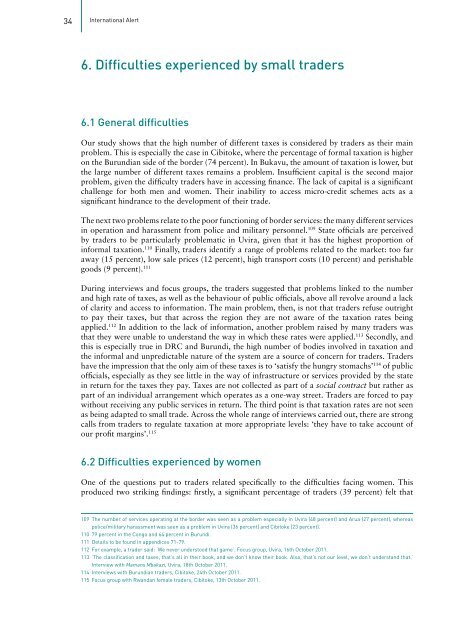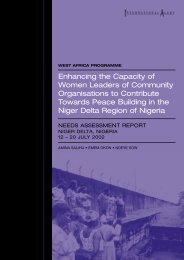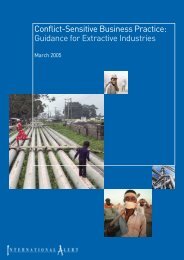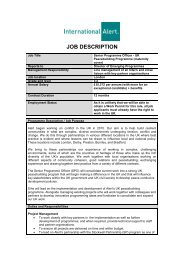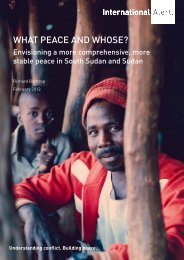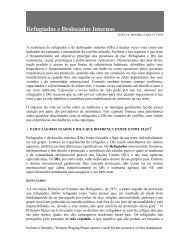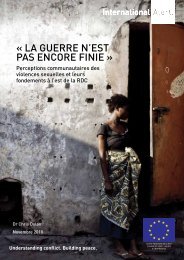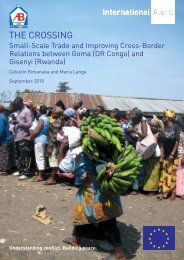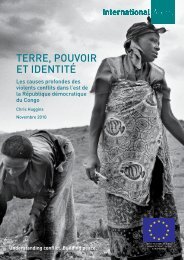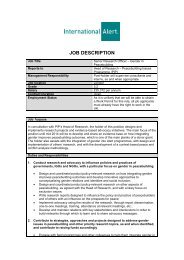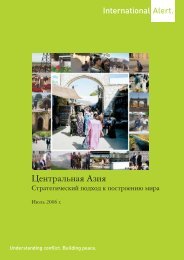Walking in the Dark: informal Cross-border trade ... - International Alert
Walking in the Dark: informal Cross-border trade ... - International Alert
Walking in the Dark: informal Cross-border trade ... - International Alert
Create successful ePaper yourself
Turn your PDF publications into a flip-book with our unique Google optimized e-Paper software.
34 <strong>International</strong> <strong>Alert</strong><br />
6. Difficulties experienced by small <strong>trade</strong>rs<br />
6.1 General difficulties<br />
Our study shows that <strong>the</strong> high number of different taxes is considered by <strong>trade</strong>rs as <strong>the</strong>ir ma<strong>in</strong><br />
problem. This is especially <strong>the</strong> case <strong>in</strong> Cibitoke, where <strong>the</strong> percentage of formal taxation is higher<br />
on <strong>the</strong> Burundian side of <strong>the</strong> <strong>border</strong> (74 percent). In Bukavu, <strong>the</strong> amount of taxation is lower, but<br />
<strong>the</strong> large number of different taxes rema<strong>in</strong>s a problem. Insufficient capital is <strong>the</strong> second major<br />
problem, given <strong>the</strong> difficulty <strong>trade</strong>rs have <strong>in</strong> access<strong>in</strong>g f<strong>in</strong>ance. The lack of capital is a significant<br />
challenge for both men and women. Their <strong>in</strong>ability to access micro-credit schemes acts as a<br />
significant h<strong>in</strong>drance to <strong>the</strong> development of <strong>the</strong>ir <strong>trade</strong>.<br />
The next two problems relate to <strong>the</strong> poor function<strong>in</strong>g of <strong>border</strong> services: <strong>the</strong> many different services<br />
<strong>in</strong> operation and harassment from police and military personnel. 109 State officials are perceived<br />
by <strong>trade</strong>rs to be particularly problematic <strong>in</strong> Uvira, given that it has <strong>the</strong> highest proportion of<br />
<strong>in</strong>formal taxation. 110 F<strong>in</strong>ally, <strong>trade</strong>rs identify a range of problems related to <strong>the</strong> market: too far<br />
away (15 percent), low sale prices (12 percent), high transport costs (10 percent) and perishable<br />
goods (9 percent). 111<br />
Dur<strong>in</strong>g <strong>in</strong>terviews and focus groups, <strong>the</strong> <strong>trade</strong>rs suggested that problems l<strong>in</strong>ked to <strong>the</strong> number<br />
and high rate of taxes, as well as <strong>the</strong> behaviour of public officials, above all revolve around a lack<br />
of clarity and access to <strong>in</strong>formation. The ma<strong>in</strong> problem, <strong>the</strong>n, is not that <strong>trade</strong>rs refuse outright<br />
to pay <strong>the</strong>ir taxes, but that across <strong>the</strong> region <strong>the</strong>y are not aware of <strong>the</strong> taxation rates be<strong>in</strong>g<br />
applied. 112 In addition to <strong>the</strong> lack of <strong>in</strong>formation, ano<strong>the</strong>r problem raised by many <strong>trade</strong>rs was<br />
that <strong>the</strong>y were unable to understand <strong>the</strong> way <strong>in</strong> which <strong>the</strong>se rates were applied. 113 Secondly, and<br />
this is especially true <strong>in</strong> DRC and Burundi, <strong>the</strong> high number of bodies <strong>in</strong>volved <strong>in</strong> taxation and<br />
<strong>the</strong> <strong>in</strong>formal and unpredictable nature of <strong>the</strong> system are a source of concern for <strong>trade</strong>rs. Traders<br />
have <strong>the</strong> impression that <strong>the</strong> only aim of <strong>the</strong>se taxes is to ‘satisfy <strong>the</strong> hungry stomachs’ 114 of public<br />
officials, especially as <strong>the</strong>y see little <strong>in</strong> <strong>the</strong> way of <strong>in</strong>frastructure or services provided by <strong>the</strong> state<br />
<strong>in</strong> return for <strong>the</strong> taxes <strong>the</strong>y pay. Taxes are not collected as part of a social contract but ra<strong>the</strong>r as<br />
part of an <strong>in</strong>dividual arrangement which operates as a one-way street. Traders are forced to pay<br />
without receiv<strong>in</strong>g any public services <strong>in</strong> return. The third po<strong>in</strong>t is that taxation rates are not seen<br />
as be<strong>in</strong>g adapted to small <strong>trade</strong>. Across <strong>the</strong> whole range of <strong>in</strong>terviews carried out, <strong>the</strong>re are strong<br />
calls from <strong>trade</strong>rs to regulate taxation at more appropriate levels: ‘<strong>the</strong>y have to take account of<br />
our profit marg<strong>in</strong>s’. 115<br />
6.2 Difficulties experienced by women<br />
One of <strong>the</strong> questions put to <strong>trade</strong>rs related specifically to <strong>the</strong> difficulties fac<strong>in</strong>g women. This<br />
produced two strik<strong>in</strong>g f<strong>in</strong>d<strong>in</strong>gs: firstly, a significant percentage of <strong>trade</strong>rs (39 percent) felt that<br />
109 The number of services operat<strong>in</strong>g at <strong>the</strong> <strong>border</strong> was seen as a problem especially <strong>in</strong> Uvira (48 percent) and Arua (27 percent), whereas<br />
police/military harassment was seen as a problem <strong>in</strong> Uvira (36 percent) and Cibitoke (23 percent).<br />
110 79 percent <strong>in</strong> <strong>the</strong> Congo and 64 percent <strong>in</strong> Burundi.<br />
111 Details to be found <strong>in</strong> appendices 71-79.<br />
112 For example, a <strong>trade</strong>r said: ‘We never understood that game’. Focus group, Uvira, 16th October 2011.<br />
113 ‘The classification and taxes, that’s all <strong>in</strong> <strong>the</strong>ir book, and we don’t know <strong>the</strong>ir book. Also, that’s not our level, we don’t understand that.’<br />
Interview with Mamans Mbakazi, Uvira, 18th October 2011.<br />
114 Interviews with Burundian <strong>trade</strong>rs, Cibitoke, 24th October 2011.<br />
115 Focus group with Rwandan female <strong>trade</strong>rs, Cibitoke, 13th October 2011.


